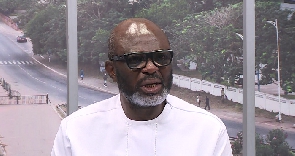 Dr Joseph Obeng, GUTA President
Dr Joseph Obeng, GUTA President
The President of the Ghana Union of Traders Association Dr Joseph Obeng has said that their plea to be given credits to facilitate trade was addressed during the State of the Nation’s Address delivered by the president yesterday.
According to Dr Joseph Obeng, President Nana Addo Dankwa Akufo-Addo made it clear that the Ghanaian economy and local businesses would be revamped under the GH¢100 billion Ghana CARES ‘Obaatampa’ programme.
Dr Obeng said this in an interview with JoyNews monitored by GhanaWeb on the post-COVID-19 alleviation project to be implemented by the government.
“We want access to affordable credit and if you listen to the president well, through the Obaatampa CARES programme, he has made it clear that as part of it they are going to establish business development banks from it… [ and] this is the kind of calls we have been making that the government should set up a parallel bank that can subsidies credit because the cost of borrowing is very high. He [Akufo-Addo] said that the interest base rate has come down to 14.5% but the same does not trickle down on the commercial rate… it means that what government has to do is to get an alternative bank for businesses to outsource credit at a cheaper rate,” he said.
Meanwhile, President Nana Addo Danquah Akufo-Addo has stated that the pandemic eroded all the economic gains made since 2017 adding that over seven hundred and seventy thousand (770,000) workers have their wages reduced while some forty-two thousand (42,000) employees were laid off due to the COVID-19 pandemic.
Delivering the State of the Nations address in the Parliament house of Ghana, Akufo-Addo noted that “Indeed, the cost of COVID-19 has been enormous. Our overall economic growth rate for 2020 was revised downwards from 6.8% to 0.9%. The non-oil economy was also revised from 6.7% to 1.6%. The revenue shortfall was estimated at GH¢13.5 billion, with additional expenditures related to stemming the tide of COVID-19 estimated at GH¢11.8 billion, with the combined effect amounting to GH¢25.3 billion, or 6.6% of GDP.”
He further added that “ The resultant fiscal deficit for 2020 was, thus, revised from 4.7% of GDP to 11.4% of GDP. This was done to reflect the impact of the pandemic. The fiscal responsibility rule of keeping a deficit within a threshold of 5% of GDP and a positive primary balance for every year was suspended in 2020 to enable fiscal operations to accommodate the impact of the pandemic”.